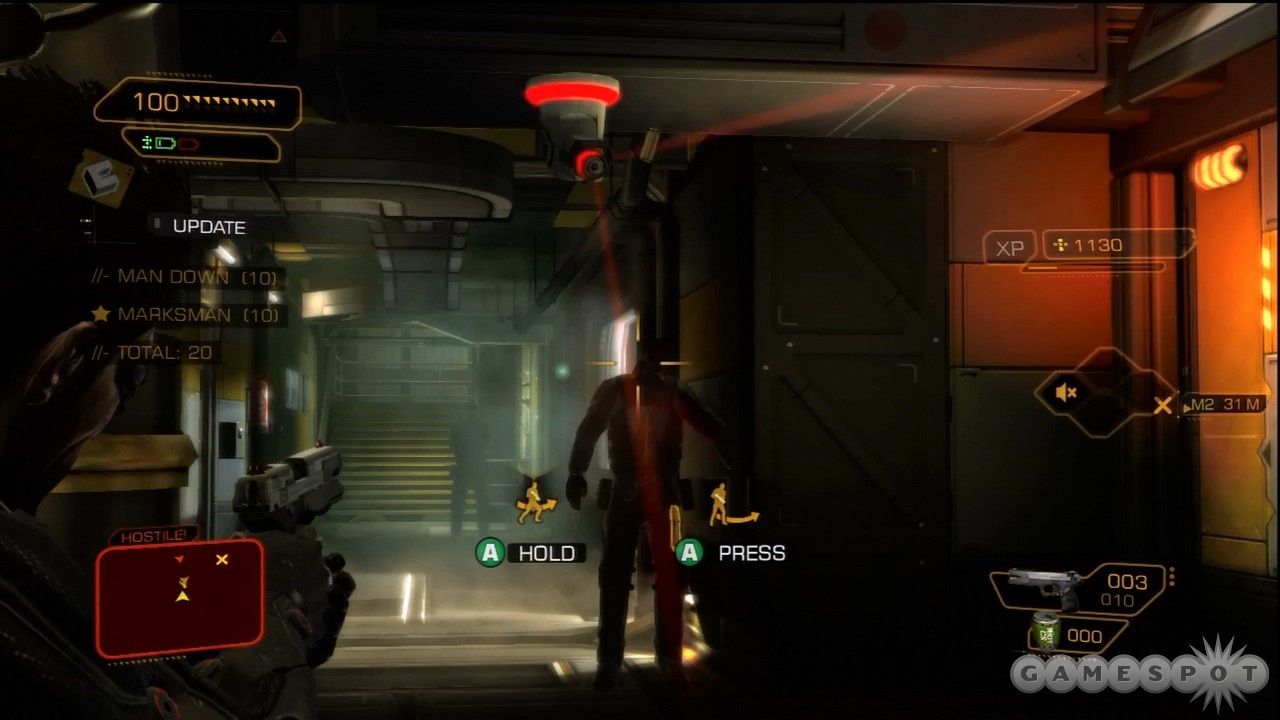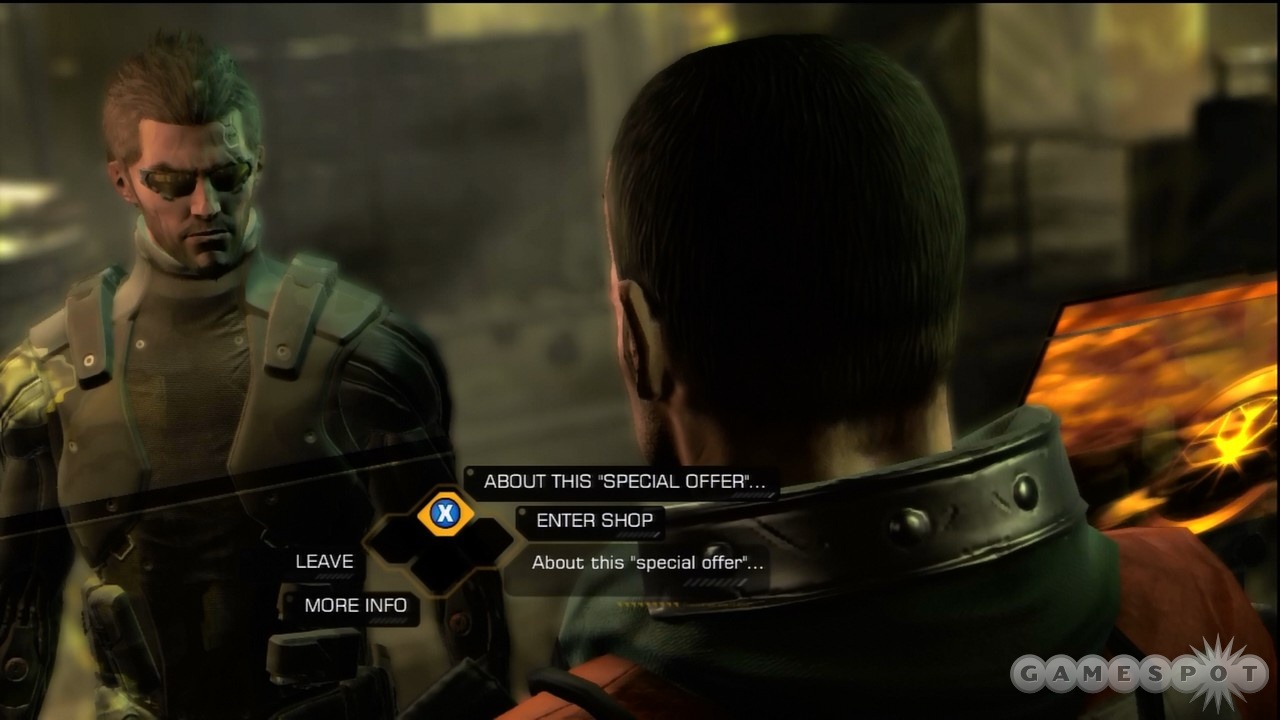Adam Jensen leads a hard life. His lady friend was kidnapped, synthetic augmentations were embedded in his body without his permission, and the head of his security insults him at every opportunity. Yet somehow, he rarely shows a mite of emotion, approaching every circumstance with a monotone that would make Ben Stein proud. Thankfully, Deus Ex: Human Revolution - The Missing Link gives his supporting characters enough heart to make up for Adam's inexpressive demeanor. This $15 (1,200 Microsoft points) add-on elaborates on the hoarse hero's journey from Hengsha to Singapore and gives you yet another chance to conquer mission objectives by force or to avoid direct confrontation and sneak your way through them. The Missing Link doesn't improve on the formula and comes with a few faults of its own in addition to the ones that permeated Deus Ex: Human Revolution. But thoughtful narrative touches and the element of choice make this a convincing reason to return to the Deus Ex universe.
In Human Revolution, Adam Jensen boarded a vessel to Singapore with the hope of unveiling the workings of a conspiracy and discovering the fate of his beloved Megan. The Missing Link explores the events on that ship, which is operated by the nefarious Belltower security group. As Adam, you are guided primarily by two figures. One is a secretive raspy-voiced Russian who guides you via headset; the other is Netanya, a ship officer who has reason to question her commander's ethics. The plot-focused narrative starts dryly but takes a wicked turn when Adam stumbles across evidence of experiments gone wrong, as well as speaks with scientists and human lab rats caught up in a scheme from which they can't escape. To spill too many details would risk spoiling important events. Suffice it to say that The Missing Link's best story moments are the most heartfelt ones. A chilling chat with a desperate woman who bargains for your assistance and a momentous decision in which you hold sway over life and death are emotional highlights in this tale.
As in the main game, strong voice acting and art design draw you in even further. The Missing Link occurs in a single self-contained environment but retains Human Revolution's international flavor, thanks to the Russian and Irish accents of some of the central characters. Sadly, the vessel's interior doesn't have the lived-in, gritty richness of Detroit or the saturated color motif of Hengsha. Without such contrasting environments, the walkways and containment units here sometimes seem ordinary. Yet lush lighting softens the sterility, while orange and green vapors nicely complement the intense blacks and golds that pervade this world. There are some unrefined details that disrupt the atmosphere, however, and some have been carried over from the main game. Facial animations seem less forced than before yet are still decidedly mechanical, and there are jarring blips during cutscenes in which camera angles and character poses abruptly adjust for no apparent reason.

Unfortunately, excessive backtracking sometimes causes the artistic vibrancy to be overwhelmed by the environmental uniformity. You must often return to areas you've already covered, but you rarely encounter more enemies or challenges to overcome. Granted, you might have the chance to hack into rooms and computers you couldn't previously access, if your skill levels weren't high enough during your initial pass through. But the later hours of this four- or five-hour adventure drag every so often. The sluggishness is enhanced by the body scanners you must pass through, which take a good number of seconds to inspect you before permitting you to move forward. Their presence has an all-too-obvious purpose: to disguise loading times. But when you're passing through a scanner for the umpteenth time, the disguise is exposed and the pace grinds to a momentary and uncomfortable halt.
These are minor quibbles, but they stand out when a single mission is taken out of the context of the whole game. But even as a stand-alone adjunct, The Missing Link is satisfying because it makes good use of Human Revolution's flexibility, letting you approach many situations as you see fit. The add-on takes away all of your praxis points and forces you to rebuild from the ground up--a contrivance, certainly, but one sensibly explained by the story. This means your Missing Link Jensen can be built differently from your main story Jensen, which gives you the chance to play with abilities you may not have experimented with initially. And so you sneak through vents, hack security terminals, and knock out uneasy guards from behind when they turn their backs. The level design is open enough to encourage exploration but tight enough that there are always walls and objects to shield you and accommodate the stealthy approach.

As before, the sneaking, shooting, and hacking come together in exciting ways. Is a turret being pesky? You could throw an EMP grenade at it to disable it. (As before, it's always a treat to watch robotic foes erupt in a flash of sparks in this manner.) Or, if you level up in a certain way, you could break into a security workstation, set the turret to target your foes, and then carry it around with you to do your dirty work. If you are strong enough, you might lift heavy boxes and discover vents that give you access to a previously unexplored office, or you might find a keycode to that office on the corpse of a guard whose throat you slice. You can take the more straightforward approach and gun your way through, too, though doing so exposes Human Revolution's typically brainless AI. Foes empty clip after clip into railings that stand between you and them, throw themselves directly onto grenades, and perform other silly maneuvers that might have you rolling your eyes.
The Missing Link's greatest triumph might be that it doesn't end with a typical boss fight. Such battles were properly maligned in Human Revolution for being out of place and not much fun. Instead, the add-on concludes with an entertaining and roomy battle that might serve as a test of your gunning skills, your sneaking prowess, or your hacking expertise--or a combination of them. It's a fine conclusion to a solid add-on that delivers more of the same rather than iterates on what came before it. But considering how Deus Ex: Human Revolution allows you to leap barriers in a number of satisfying ways, that's no bad thing.



